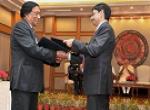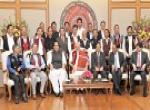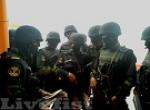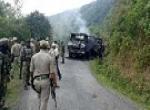The killing of 24 people in Assam by NDFB—with a definitive accent on Hindi-speaking targets—has proven not only the futility of prolongation of ceasefires with insurgent organisations, but also the fact that engineering of splits in such outfits only has a detrimental effect. The latest action by the anti-talk faction of NDFB should convince the authorities that opening parleys with only one faction of ULFA—interestingly with leaders under incarceration inside Assam—would have a similar effect, especially as the hardliners led by ULFA chief of staff, Paresh Baruah has chosen to stay away from a dialogue process.
The ceasefire with NDFB—which came into effect on 2004—was meant to be a comprehensive affair. The entire group was to be covered by the cessation of hostilities. But, not only the chairman of the organisation, Ranjan Daimary stayed on in Bangladesh, but an entire battalion of the organisation—the 3rd Battalion—too continued to be garrisoned in the erstwhile East Pakistan, infiltrating its cadres to perpetrate violence inside Assam, the most notable yet being the 30 October 2008 serial blasts in Assam as also to carry out extortion and other illegal activities. Furthermore, Daimary had—until his apprehension by the Bangladesh authorities and subsequent handing over to the Assam Police—continued to publicly berate India, with little or no notice from the authorities. The author is privy to video clippings which show vitriolic anti-India rhetoric by the NDFB chairman on the organisation’s Raising Day, as also footage of the 3rd Battalion’s training in Bangladesh. This was well into six years after the ceasefire was signed. An absolute mockery was made of the cessation of violence. Indeed, anecdotal reports have opined that even NDFB cadres who came over ground and are billeted in designated camps inside Assam are not only flouting ceasefire rules by indulging in activities such as extortion, but apparently a section of the cadres inside Assam—they have assumed the nomenclature NDFB (Progressive) —are in touch with cadres of the anti-talk faction, reportedly aiding their anti-India activities, including the mass killings that was carried out on 8 November 2010.
Moreover, it should dawn on the authorities that the attacks—the killings took place in seven different areas, as apart as the Assam-Arunachal Pradesh border (Boimara) and Kekerikuchi in Baksa district of Assam—was a coordinated one, in all probability directed by one Sanjiabath alias Rongutti, the 3rd Battalion’s 2 i/c who is matching up the actions from Srimangal in Bangladesh. Another report has attributed that even Ranjan Daimary is involved—directing his cadres from inside Assam’s Nagaon jail where he is incarcerated. There is also an unconfirmed report that NDFB’s Arun Borgoyari masterminded the carnage, but the fact remains that it was a well coordinated affair, in line with the 30 October 2008 serial blasts in Assam that took over 100 lives.
Claiming responsibility—a trademark that is incidentally not part of ULFA’s “war ethics”—the anti-talk faction of NDFB has stated that the killings was a retaliation for the neutralisation of one of its cadre, Mahesh Basumatary near Dhekiajuli in Assam by a combined team of the army and the Assam Police, Indeed, the faction has warned that it would eliminate 20 people for each cadre that the security forces would kill. The 8 November 2010 carnage was not only an illustration of the threat, but also of another important aspect that the authorities have failed to comprehend.
Deliberate targeting of Hindi-speaking residents of Assam started with ULFA when it went on a series of rampage, targeting Hindi-speaking people all over Assam. The objective of the organisation was simple: target people that attract the attention of New Delhi (indeed, many important Hindi-belt politicians came to Assam after such incidents to both protest the killings and provide succour to the families of the victims) as also ones that do not raise the chauvinistic heckle of the Assamese community: an exercise in hypocrisy that should shame the Assamese society. Although people from other communities including the Bodo stock were killed in the latest incident, the stratagem has been “Mail by Killings.” Almost all insurgent outfits in the North East has come to comprehend that New Delhi would take worthier note if their victims were to be heartland India Hindi-speakers. This was a device that was perfected by ULFA: little or no protest from the Assamese, a community which revolted when Assamese women and children were killed in Dhemaji on 15 August 2004; New Delhi and important politicians take note; the space left by the Hindi-speaking persons (mostly from the proletariat class) would be taken up by the illegal Bangladeshi migrant. In one fell swoop, ULFA ensured that it was able to gain three brownies. The novelty of the strategy has been adopted by KYKL in Manipur, KLNLF in Karbi Anglong and Dima Hasao and now Ranjan Daimary’s faction of NDFB, with devastating effect.
An aspect that New Delhi must realise is that splitting an insurgent group—in keeping with the medieval Kautiliyan policy of Saam (reconciliation) Daam (monetary inducement) Dand (punishment) and Bhed (split)—the last of which being the strategy in the present NDFB-ULFA makeover, among a plethora of others would not work. Indeed, it is analysed that—were the hardliners to be left out (by way of people such as Paresh Baruah and Ranjan Daimary)—the movement would become even more belligerent, as indeed it has in the case of NDFB in the latest incident of wanton violence. This would certainly be the case were a dialogue process to be started with the so-called pro-talk ULFA faction. Paresh Baruah would ascertain that violence is writ all over Assam if talks were to take place. Dialogue with insurgency should be a comprehensive affair. The short-sightedness with which NDFB chairman, Ranjan Daimary was allowed to stay on in Bangladesh after the ceasefire with his organisation, and the subsequent subterfuges he involved himself in should act as a pointer.
Another aspect that may have lost Indian security scrutiny is the fact that the anti-talk NDFB faction is training in Myanmar’s Sagaing Division, a camp that closely abuts an ULFA camp in the same area. It is the author’s analysis that—given the ground alliance that had characterised ULFA-NDFB proximity in the past (despite the cartographical dissonance that imposes upon their design of Swadhin Asom (Sovereign Assam) and sovereign Bodoland)—Paresh Baruah might well have had a hand in the latest reign of “NDFB” terror. Despite recruitments continuing apace into ULFA, there are reports that there is a modicum of demoralisation in ULFA’s 28 Battalion’s “Bravo” company, with indication that it may follow the steps of the battalion’s “Alpha” and “Charlie” companies that came over ground in 2008. Paresh Baruah is steadfast on careening the dialogue process which New Delhi and Dispur is attempting to work out with the so-called “pro-talk” faction of ULFA. Indeed, in its magnanimity, the authorities have already released not only ULFA vice chairman, Pradip Gogoi, political adviser, Bhimkanta Buragohain, publicity secretary, Mithinga Daimary, but also the organisation’s dreaded operations commander (some sources have termed him as the deputy commander-in-chief of ULFA), Raju Barua. Barua was a veritable Dronacharya for ULFA cadres in his “Enigma” training camp in Bhutan, and was responsible for a number of important operations inside Assam. It is not understood as to why the Assam government has chosen not to oppose his bail, thereby allowing free passage to a ULFA leader of his menace. The manner of quid-pro-quo is not clear, although sources seem to be of the opinion that Barua may be able to convince his erstwhile trainees to tread the soft-line and come over ground. But it is opined that an ULFA cadre like Raju Barua—with much to answer for the violence in Assam—would not be amenable to such a course of action. It is learnt that he has fallen from Paresh Baruah’s grace, but the operations commander of ULFA (as do other released leaders of ULFA), it is certain, understands the threat that they would be under were they to tread an anti Paresh Baruah line. But, more importantly, such “acts of magnanimity” by the dispensation is performing as a wrong precedence: the writ of law is being circumvented and procedures that should have been followed to try criminals have been put on the back-burner, perhaps for electoral considerations. This certainly does not augur well for a state that is constantly bearing the brunt of terrorism.
- But as of NDFB, it is important to realise the following:
- It is training in Myanmar’s Sagaing Division alongside ULFA and Manipur’s PLA. In all probability, the recent action by the anti-talk faction of NDFB was supported by Paresh Baruah.
-
- The killings of the 24 people by the anti-talk faction of NDFB can be analysed in the following ways:
- It was meant to convey to New Delhi that the anti-talk NDFB means business and therefore New Delhi must take it seriously, albeit release the faction’s chairman, Ranjan Daimary (despite his confirmed complicity in the 30 October 2008 serial blasts).
- Over ground Bodo groups and political formation in hand with a certain section in the dispensation in Dispur would want the release of Ranjan Daimary and to kick-start a peace process with a perprator such as Daimary who has the blood of scores of innocent Indian lives. It is an established fact that Ranjan Daimary with active support from the ISI-DGFI carried out the serial blasts of 30 October 20008. But the magnanimity of the Indian democratic system might countenance quarter for even such a criminal. This aspect has been proven by way of grant of bail to persons such as ULFA’s operations commander, Raju Barua.
- It must be noted that a friendly government in Dhaka handed over Ranjan Daimary to India. But with his apprehension, a sense of complacency came over the Assam administration, with the officialdom in Dispur predicting the demise of NDFB and the Bodo armed movement. They did not fathom that NDFB would be a much more dangerous organisation, with a severed head, but with a body intact. After all the crackdown in Bangladesh has not quite affected NDFB as it has ULFA. Sanjiabath alias Rongutti is still operating out of Bangladesh while the organisation’s Dilithang has taken charge of the organisation inside Assam.
- As aforesaid, it is reported that ULFA chief of staff, Paresh Baruah, who had developed close ties with Ranjan Daimary, is funding NDFB for operations for which he is not willing to trust his own cadres, especially as there is a rumour that ULFA’s 28 Battalion’s “Bravo” camp may throw in the towel soon. With the sort of kinship he has with anti-India forces like the ISI (recent reports have indicated that Baruah could be hobnobbing with the Chinese MSS as well), it is not impossible that he has entered this game. Furthermore, there are reports that Baruah has transferred considerable funds to NDFB for carrying out three types of action (a) attacks on settlers, especially Hindi speakers which is Paresh Baruah’s agenda number one (b) carry out explosions, primarily targeting security forces (c) high value assassinations, including the targeting of Assam chief minister, Tarun Gogoi.
- There has been a modicum of security force pressure on the anti-talk faction of NDFB, and the loss of field commanders is also prompting NDFB to strike at soft targets in order to ensure that the security grid reverts to increased levels of static deployments to prevent more killings of innocent civilians. The strategy is to reduce the offensive action of the counter-insurgency operations. As aforesaid, the neutralisation of one of its cadres, Mahesh Basumatary triggered the killings.
It is a welcome development that the Union Home Minister, P. Chidambaram came to Guwahati to take personal stock of the situation. He has also directed the security forces to “launch an all-out operation against the ultras and tackle them with an iron hand.”New Delhi must, however, realise that only military action would not suffice. Certain recommendations are made below:
--------------------------------------------
Published Date : November 20, 2010









Post new comment